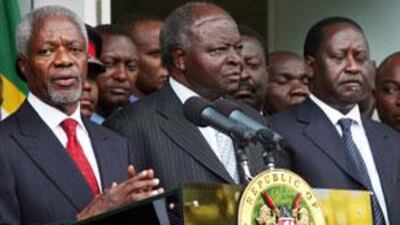NAIROBI // Days after Kofi Annan, a former UN secretary general, sent the names of suspected instigators of Kenya's post-election violence to the International Criminal Court, members of parliament have held emergency meetings to establish a local tribunal and avoid the international justice system. The move by Mr Annan ended months of heel-dragging by Kenyan politicians and brings victims of the worst violence in Kenya's post-independence history one step closer to justice.
"Justice delayed is justice denied," Mr Annan said in a statement. "Any judicial mechanism to bring the perpetrators of the post-election violence to justice must meet international legal standards." Kenya's presidential election in December 2007 was flawed, international poll monitors said, and Raila Odinga, the challenger, accused Mwai Kibaki, the president, of vote-rigging. Nevertheless, Mr Kibaki was sworn in for a second term, sparking a spate of violence that degenerated along tribal lines.
For two months, tribes, in particular the Kikuyu of Mr Kibaki, and the Luo, Mr Odinga's tribe, plus the Kalenjin slaughtered each other with clubs, machetes and bows and arrows. By March 2008, at least 1,300 people were dead and 300,000 were displaced. A power-sharing deal brokered by Mr Annan ended the violence and a coalition government was formed. In the year and a half since the violence, the government has threatened to unravel on a number of occasions. Rival parties within the coalition have bickered over cabinet appointments, budget allocations, even the price of maize.
A major stumbling block to a cooperative government has been the establishment of a justice system to try the masterminds of the election violence. A commission of inquiry last year reported that a number of top politicians had incited the violence. The report said that if the suspects do not face justice, Kenya could explode into more violence after the next presidential election in 2012 because a culture of impunity will prevail.
The commission recommended that Kenya establish a local tribunal to try the suspects, still unnamed. If the government failed at that, Mr Annan threatened in October, when the report was made public, he would deliver the names of the suspects in a sealed envelope to the prosecutor of The Hague-based ICC, the world's first permanent war crimes court. Deadlines came and lapsed with parliament making little progress on the local tribunal. This month, government officials asked Mr Annan for a year-long extension. Growing increasingly frustrated, Mr Annan finally washed his hands of the matter and gave the sealed envelope to Louis Moreno-Ocampo, the ICC prosecutor.
Kenyan politicians, used to a more patient Mr Annan, felt betrayed by the former UN chief, who is Ghanaian. Mr Annan "did not give any hint that he would" hand the envelope over, James Orengo, a cabinet minister who recently met with Mr Annan in Geneva, said in a press conference. Mr Moreno-Ocampo has said he is considering the case, but he has a full plate with open investigations into war crimes in Sudan, Uganda, the Democratic Republic of Congo and the Central African Republic.
"I will open the envelope, I will read, I will understand what the commission was discussing and then I will seal it again," Mr Moreno-Ocampo said, according to Reuters. "I will not use it again because I have to collect my own evidence and make my own conclusions." Meanwhile, Kenyan politicians, eager to avoid the international court that has already indicted the president of Sudan for war crimes, are busy crafting a law that would establish a local tribunal. Cabinet members are meeting this week to expedite the legislation.
Western diplomats in Nairobi last week urged the government to step up efforts to establish an internationally acceptable tribunal. Anna Brandt, the Swedish ambassador, said, in a statement representing 25 diplomatic missions, that if the government is unable to set up a local court it should let the ICC take the case. Kenyans are divided between a local tribunal and the ICC. Some think a local tribunal, established by politicians, will not have the teeth to try the top politicians suspected of the atrocities.
Analysts believe the names of at least two sitting cabinet members are on the sealed list. Others are afraid Kenya will lose some of its autonomy by letting an international court handle what should be Kenya's internal affairs. mbrown@thenational.ae

